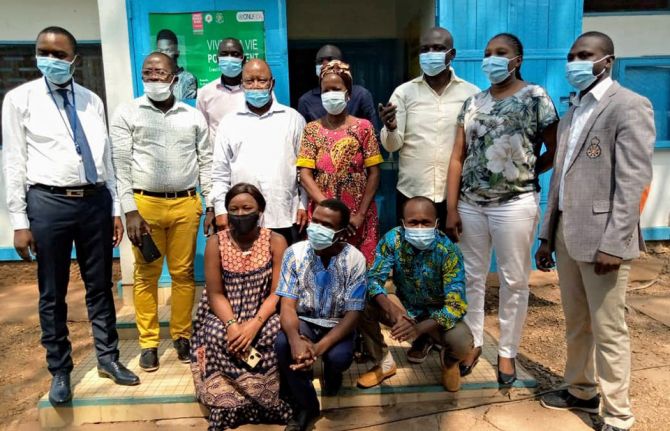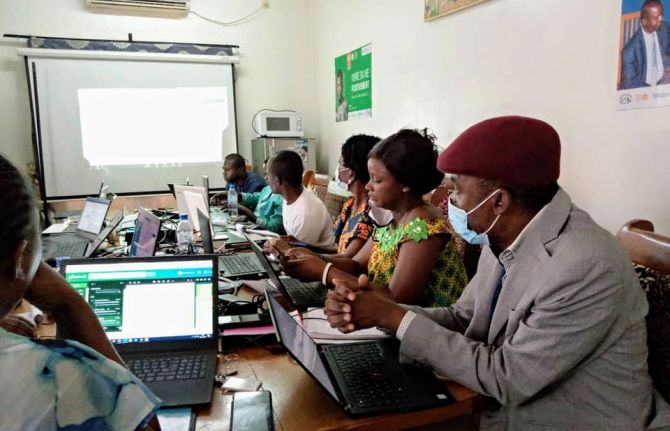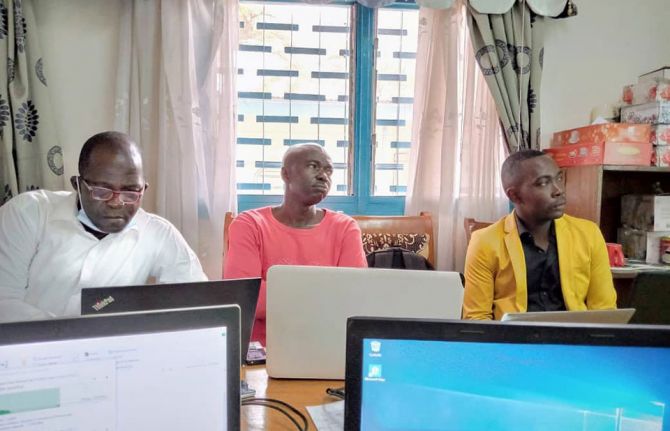



Feature Story
Central African Republic: producing HIV estimates in the context of crisis
28 January 2021
28 January 2021 28 January 2021The presidential and legislative elections in the Central African Republic on 27 December 2020 were meant to mark the consolidation of democracy and bolster economic and social recovery in a country tormented by decades of conflict and humanitarian challenges. However, the electoral process has given way to a serious political and military crisis, with the resurgence of armed conflict and a blockade of the main trade and supply routes to the landlocked country by rebel groups.
It is in this context of crisis, and in the aftermath of bloody clashes between armed groups and government forces on the outskirts of the capital, Bangui, that the UNAIDS country office in the Central African Republic hosted a workshop to produce HIV estimates for the country from 18 to 22 January. This important annual exercise is conducted by UNAIDS with national authorities in all regions of the world to provide countries and HIV stakeholders with essential data on the pandemic and the response.
Marie Charlotte Banthas, the Director of Disease Control at the Ministry of Health, oversees HIV and tuberculosis treatment programmes in the Central African Republic. Over the past three years, her services have been at the forefront of efforts to accelerate access to antiretroviral therapy from some 25 000 people on treatment in 2016 to more than 48 000 in June 2020. A former head of monitoring and evaluation at the Ministry of Health, she considers the HIV estimates workshop a priority, despite the deteriorated security situation. “There is no effective response to HIV without data. We need to hold this workshop to provide the country with reliable data to better guide our efforts and improve the care of our patients,” she said.
Civil society also considers HIV estimates as a crucial endeavour. Bertille Zemangui is the President of the National Network of Free Girls, a sex workers’ organization representing key populations. To attend the HIV workshop, Ms Zemangui had to travel long distances each day through sensitive areas. The increased cost of public transport due to the crisis was not enough to discourage Ms Zemangui and other workshop participants. “The current situation is difficult. Everything has become expensive: transportation, food. But we have to be there to make our voice heard because it is sex workers and other key populations that are most affected by HIV in the Central African Republic,” she said. According to data from a 2019 survey, HIV prevalence among sex workers is 15% and 6.5% among gay men and other men who have sex with men, compared to 3.5% among all adults in the country.
For security reasons, the estimates workshop was moved to the UNAIDS office and participation was reduced to national and international experts and members of civil society. “This workshop provided us with a clearer idea of the magnitude and trajectory of the epidemic for 2021. These are essential to measuring our progress towards achieving the 95–95–95 goals,” said Marcel Massanga, the Deputy National Coordinator of the National AIDS Control Council. The workshop also served to identify approaches to improve the quality and completeness of HIV data in the Central African Republic. Thus, the participants agreed on the need to integrate HIV data into the District Health Information System 2 (DHIS2) platform with a view to strengthening the health system.
There are concerns that the volatile security situation could jeopardize the Central African Republic’s efforts to accelerate its HIV response. In 2020, the country launched an ambitious National HIV Strategic Plan 2021–2025, which aims to eliminate discrimination, halve new HIV infections and ensure that 95% of people living with HIV access antiretroviral therapy by 2025. “It will not be possible to achieve these ambitious goals without peace and stability. Already we have information that in several areas people living with HIV have fled into the bush and are without treatment. We must quickly implement contingency plans to respond to these emergencies,” said Patrick Eba, the UNAIDS Country Director for the Central African Republic.



